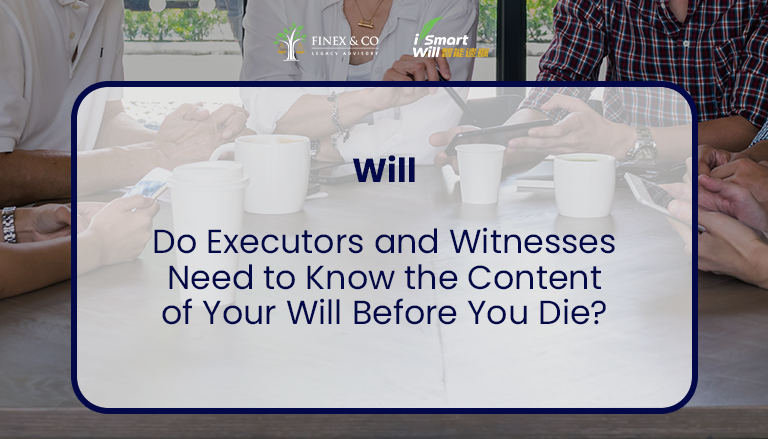Mr. Lim, a retiree, recently decided to draft a will to ensure his assets are distributed according to his wishes. He appointed his trusted friend, Mr. Tan, as the executor of his will and asked his neighbour, Mrs. Lee, and his niece, Emily, to act as witnesses. However, Mr. Lim is unsure whether it’s necessary for Mr. Tan, Mrs. Lee, and Emily to know the contents of his will before his passing. Let’s explore this question.
What is an Executor?
An executor is someone you appoint to carry out the instructions in your will. Their main responsibilities include:
- Collecting and managing your assets.
- Paying off any debts.
- Distributing the remaining assets to your beneficiaries as stated in the will.
For a detailed overview of an executor’s duties, you can refer to our guide here: A Comprehensive Guide to Executor Duties in Malaysia.
Do Executors Need to Know the Contents of the Will?
Legally, it is not required for executors to know the contents of your will before your passing. It is entirely up to you whether to share this information with them. Both approaches have their own advantages and disadvantages.
If the Executor Knows the Contents:
Advantages:
- Clear Understanding: You can explain your intentions directly to the executor, helping to prevent misunderstandings later.
- Preparation: The executor can plan ahead for potential challenges, such as handling complex assets or managing disputes among beneficiaries.
Disadvantages:
- Risk of Confidentiality Breach: Sharing your will’s details in advance could lead to premature discussions or conflicts among beneficiaries.
- Added Pressure: Knowing the details of the will might stress the executor, especially if it involves sensitive matters like unequal asset distribution.
If the Executor Does Not Know the Contents:
Advantages:
- Confidentiality Maintained: Your will remains private until it needs to be executed, reducing the likelihood of family tensions.
- Neutral Execution: The executor can approach the task without preconceived notions or bias, ensuring fairness in carrying out your wishes.
Disadvantages:
- Limited Preparation: Without prior knowledge, the executor might face difficulties in handling unexpected challenges, potentially leading to delays or mistakes.
- Lack of Awareness of Appointment: The executor might not even know they have been appointed, and therefore no one will take action to proceed with obtaining the Grant of Probate (GP). This could cause significant delays in the administration of your estate.
What is a Witness?
A witness is someone who observes you signing your will and confirms that you did so voluntarily and with a sound mind. Their role is crucial in validating the authenticity of your will. To learn more about the role of witnesses and how they can affect the validity of your will, check out our article here: Does the Witness Affect the Validity of a Will in Malaysia?.
Do Witnesses Need to Know the Contents of Your Will?
Legally, witnesses do not need to know the contents of your will. Witnesses, like Mrs. Lee and Emily, are only required to:
- Ensure that you signed the will in their presence.
- Confirm that you were of sound mind and signed the document voluntarily.
Their knowledge of the will’s contents is unnecessary for its validity.
Best Practices for Executors and Witnesses
Here are some tips to ensure smooth estate administration:
- Provide Clear Instructions: While it’s not mandatory to share the will’s contents, it can help to give your executor, like Mr. Tan, general guidance about their responsibilities.
- Maintain Confidentiality: Avoid revealing unnecessary details to prevent potential disputes or misunderstandings among family members.
- Seek Legal Advice: Executors may benefit from legal guidance to better understand their duties and avoid common pitfalls.
It is not legally required for executors or witnesses to know the contents of your will before your death. Whether or not to share this information depends on your personal preference and the level of preparation you want your executor to have. For Mr. Lim, the decision lies in whether he feels Mr. Tan should be informed in advance or kept in the dark until the time comes. Either way, clear instructions and confidentiality can help ensure a smoother process for all involved.
You may make an appointment with our legal advisor here: https://calendly.com/finex-and-co-legacy-advisory/tea-talk-with-legalexpert
执行人和见证人在你去世前需要知道遗嘱内容吗?
林先生是一位退休人士,最近决定立下遗嘱,为了确保他的资产按照自己的意愿进行分配。他委托了自己信任的朋友陈先生作为遗嘱执行人,并请邻居李太太和侄女Emily担任见证人。但是林先生不确定有没有必要在去世前让陈先生、李太太和Emily知道遗嘱的内容。让我们一起来探讨一下这个问题。
什么是执行人 (Executor) ?
执行人是你指定的人,负责按照遗嘱中的指示执行这份遗嘱。他们的主要责任包括:
- 收集和管理你的资产。
- 还清遗产的债务。
- 将剩余的资产分配给遗嘱中的受益人。
执行人需要知道遗嘱的内容吗?
从法律上讲,执行人在你去世之前并不需要知道遗嘱的内容。需不需要告知执行人完全取决于你。两种做法各有优缺点。
如果执行人知道遗嘱内容:
优点:
- 明确了解:你可以直接向执行人解释自己的想法,从而避免日后在执行遗嘱有误解。
- 提前准备:执行人可以提前规划,准备应对可能面对的挑战,比如处理复杂资产或者应对受益人之间的争议。
缺点:
- 可能泄露隐私:提前透露遗嘱的细节可能导致早期讨论或家庭成员之间的冲突。
- 增加压力:如果遗嘱涉及敏感问题,如不平等的资产分配,执行人可能会感到额外的压力。
如果执行人不知道遗嘱内容:
优点:
- 保密:遗嘱在你去世之前保持私密,减少当下家庭成员之间的纷争可能性。
- 中立执行:执行人在执行遗嘱时没有偏见,可以确保公正地履行你的意愿。
缺点:
- 准备不足:没有提前了解,执行人可能会面临一些意外的困难,导致延误或错误。
- 没有意识到自己被指定成为执行人: 执行人可能根本不知道自己被指定了执行遗嘱,结果也就没有人去申请遗嘱认证书(Grant of Probate)。这样可能会导致处理遗产的过程严重延误。
什么是见证人 (Witness) ?
见证人是指在你签署遗嘱时,亲眼见证并确认你是自愿签署并且神志清晰的人。
见证人需要知道遗嘱内容吗?
从法律上讲,见证人不需要知道遗嘱的内容。像李太太和Emily一样,见证人只需做以下几件事:
- 确保你在他们面前签署遗嘱。
- 确认你在签署遗嘱时神志清晰而且是自愿的。
他们对遗嘱内容的了解并不影响遗嘱的有效性。
执行人和见证人的最佳做法
以下是确保顺利执行遗产管理的一些建议:
- 提供清晰的指示:虽然并不强制要求告知遗嘱内容,但可以向执行人(如陈先生)提供一些基本而且清楚的指示。
- 保持保密性:避免透露不必要的细节,避免家庭成员之间产生争执或误解。
- 寻求法律建议:执行人可以向专业人士咨询,更清楚地了解自己的职责。
总结来说,执行人和见证人在你去世前不需要知道遗嘱的内容。是否告诉他们取决于你个人的意愿和你希望执行人提前准备的程度。无论如何,清晰的指示和保密性有助于确保遗产执行过程顺利。















